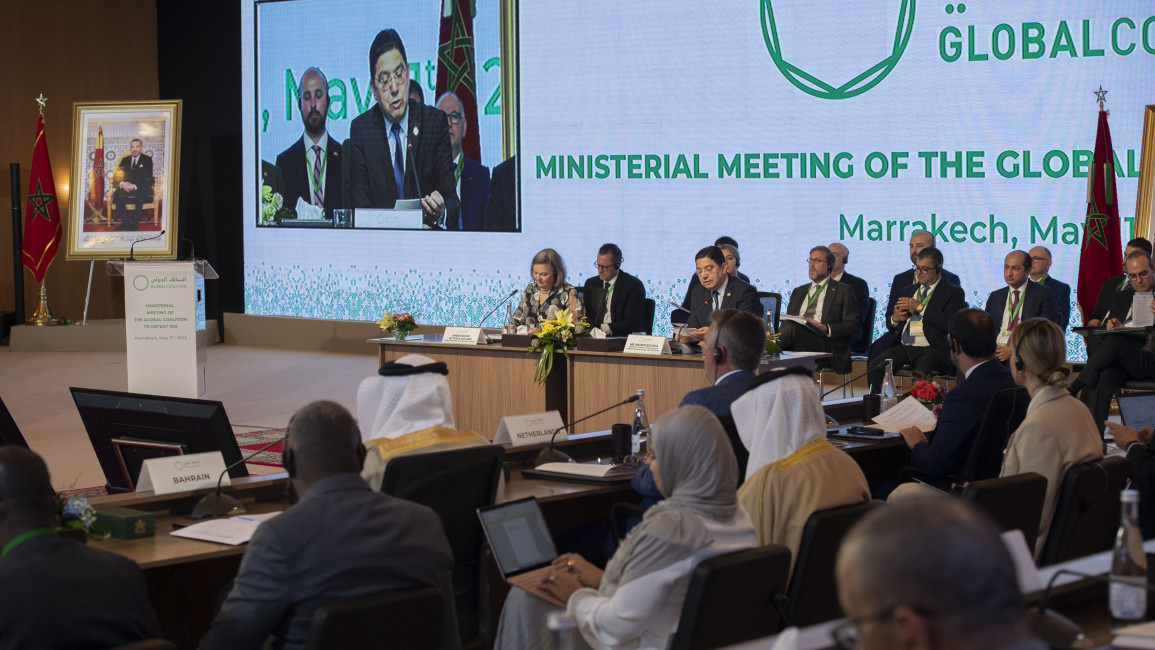Anti-IS coalition meet in Morocco to counter group's revival
The global coalition against the Islamic State group met Wednesday in Morocco to coordinate efforts to prevent a new insurgency in the Middle East and North Africa.
US Secretary of State Antony Blinken was due to have co-hosted the meeting with Moroccan Foreign Minister Nasser Bourita, but Washington's top diplomat tested positive for Covid-19 and was replaced by senior diplomat Victoria Nuland.
Senior officials from dozens of other countries also attended the meeting, the coalition's first yearly ministerial summit on African soil, under high security at a discreet luxury hotel in Marrakesh.
Nuland said they were committed to the "enduring defeat" of the jihadist group also known as Islamic State group, or Daesh in Arabic.
"Over the last several years, ISIS has been considerably weakened in Iraq and Syria, but it remains a threat, seeking any opportunity to reconstitute itself," she said.
Bourita said the threat posed by IS had "not diminished" and that the coalition sought to raise $700 million for "stabilisation activities" in parts of Iraq and Syria formerly held by the group.
The discussions covered "stabilisation efforts in areas previously impacted by Daesh", strategic communication against the group's "radicalisation propaganda" and the battle against foreign fighters, the Moroccan foreign ministry said.
The meeting came three years after the coalition helped local forces crush the "caliphate" IS had proclaimed in Iraq and Syria but as the jihadists step up their efforts to bolster their presence in the Sahel region and West Africa.
Bourita said some 1.4 million people in the two regions had been displaced due to conflict, and that "terrorist incidents" were on the rise.
The Global Coalition against Daesh was formed in 2014 after the militants seized huge swathes of Iraq and Syria. It now includes 84 states and international organisations.
Officials have long warned IS still poses a worldwide threat despite its loss of a territorial base.
In January, IS fighters launched their biggest assault in years, a prison break in the Kurdish-controlled northeast Syrian city of Hasakeh, sparking a week of intense fighting that left hundreds dead.
Nuland called that attack "a reminder of their intent and a wake-up call about how untenable the current situation is in northeast Syria".
IS has vowed to take revenge for its elusive leader Abu Bakr al-Baghdadi, who blew himself up during a US raid in northern Syria in late 2019.
It has also urged its supporters to take advantage of the war in Ukraine to carry out attacks in Europe.


![Minnesota Tim Walz is working to court Muslim voters. [Getty]](/sites/default/files/styles/image_684x385/public/2169747529.jpeg?h=a5f2f23a&itok=b63Wif2V)




![Debris near Rafic Hariri International Airport [Getty]](/sites/default/files/styles/image_212x120/public/2176162423.jpeg?h=a5f2f23a&itok=XLiO6WHk)
![An Israeli air strike on Jabalia killed teenage journalist Hassan Hamad [Screengrab/X]](/sites/default/files/styles/image_330x185/public/2024-10/hassan%20hamad1.jpg?h=c12e0b96&itok=Rd_dyCVp)
